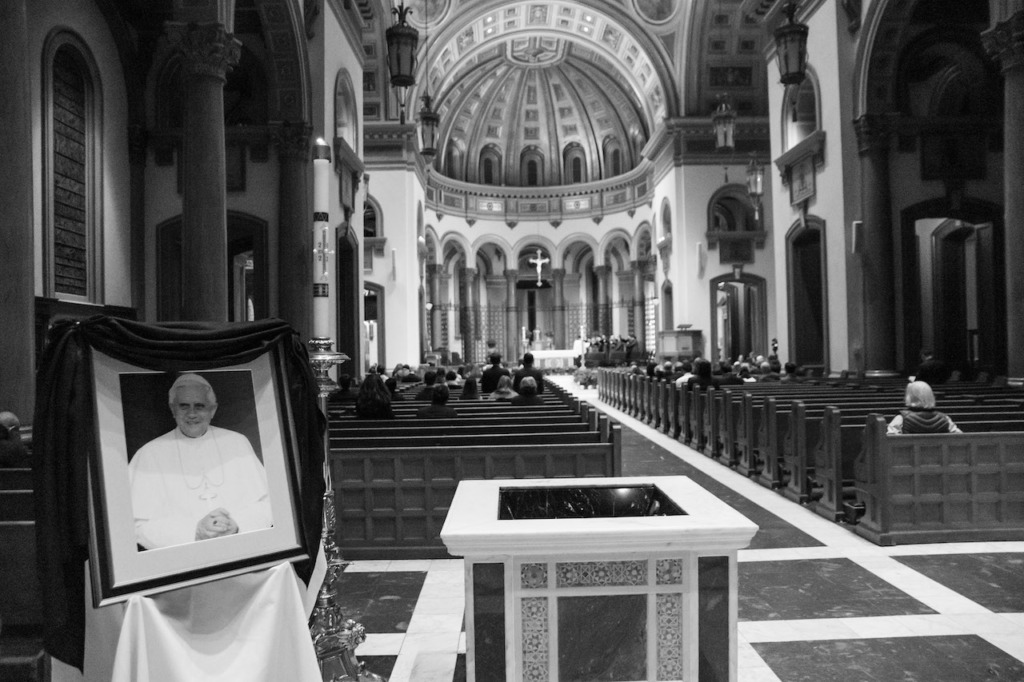Following the death of Pope Benedict XVI, I found myself reflecting on the seven men who occupied the Chair of Peter during my lifetime. In retrospect, each of these pontiffs have helped form my spirituality in ways that continue to this day.
During my childhood and through adolescence, Pope Pius XII served as Vicar of Christ. My most vivid memory of his pontificate was his proclamation in 1950 about Mary, Mother of God, who, following the course of her earthly life, was assumed into heaven body and soul.
In declaring as doctrine a fact that was generally accepted by most Catholics, Pius XII wished to engender hope during a time when so many cares and anxieties weighed upon people. The same could be said for us today. We can look to Mary as a prototype of what awaits the faithful, not as an escape from this life, but as the end for which we were created.
Following the death of Pope Pius XII, Angelo Giuseppe Roncalli was elected pope. He took the name Pope John XXIII, and although his pontificate was short lived (only five years), his impact upon 20th century Catholics was immense.
Shortly after assuming the papacy, he convoked the Second Vatican Council, explaining, “The Church has always opposed errors. Nowadays, however, the Spouse of Christ prefers to make use of the medicine of mercy rather than that of severity.”
Although he died before the council ended, his deathbed comment has endured: “It is not that the Gospel has changed; it is that we have begun to understand it better.”
His successor, Pope Paul VI, presided over the conclusion of Vatican II. Hailed as one of the great milestones in the Church, the council advanced the role of the laity through active participation in liturgy and ministerial roles. It opened the door to ecumenical and inter religious dialogue, an initiative that Paul VI highlighted by insisting that “Nostra Aetate” be published as a stand-alone document rather than attaching it to an existing one.
Yet, Pope Paul VI is most often identified by his encyclical “Humanae Vitae.” At a time when many Catholics were expecting the pope to allow married couples to use artificial contraception, he came down against it. What many Catholics may not know is that he was simply reaffirming what previous popes had already expressed in encyclicals regarding procreation.
In 1978, Albino Luciani was elected pope and chose the name Pope John Paul I as a gesture
of respect to the two men who preceded him. Known as the “smiling pope,” he is remembered for having one of the shortest papacies in history. Thirty-three days after taking office, he died of a heart attack. (In 1590, Pope Urban VII died 12 days after being elected pope.)
He was succeeded by Pope John Paul II who served for more than 26 years – the second longest papacy after that of Pope Pius IX’s 31-plus years. His accomplishments and popularity are well known, but they did not shield him from an attempted assassination.
John Paul II’s appeal to the youth of the world was as unprecedented as his charismatic personality, which earned him the moniker of “rock star pope.”
In contrast to his outgoing personality, his successor, Joseph Ratzinger, was a theologian, scholar and academic who was naturally shy. Having served as the prefect for the Congregation for the Doctrine of Faith, Pope Benedict XVI surprised his critics with his first encyclical, “God is Love.” His books about Jesus of Nazareth remain a testimony to his broad appeal to ordinary people as well as to scholars.
However, his decision to resign from office – the first pope in almost 600 years to do so and undoubtedly a sign of his humility – will remain a lasting footnote to his papacy.
In a world where so many politicians vie for power and go to extremes to remain in power, Pope Benedict’s example bears witness to the Gospel paradox that meekness is a sign of strength. As pope emeritus, he dispelled the idea that the papacy is a lifelong commitment.
Each pope had supporters as well as de- tractors, which should come as no surprise. The only way to avoid criticism is to do nothing, and these popes were men of action. Like- wise, Pope Francis has no shortage of critics nor of enemies.
Not unlike the saint whose name he bears, who was called troubadour, fool, madman and saint, one might ask: how could it be otherwise for these servants of God? The cross and discipleship will always go hand in hand, a lesson instilled in me by each of these saintly men, by the way they lived and died.
May they rest in peace and may God bless Pope Francis!

